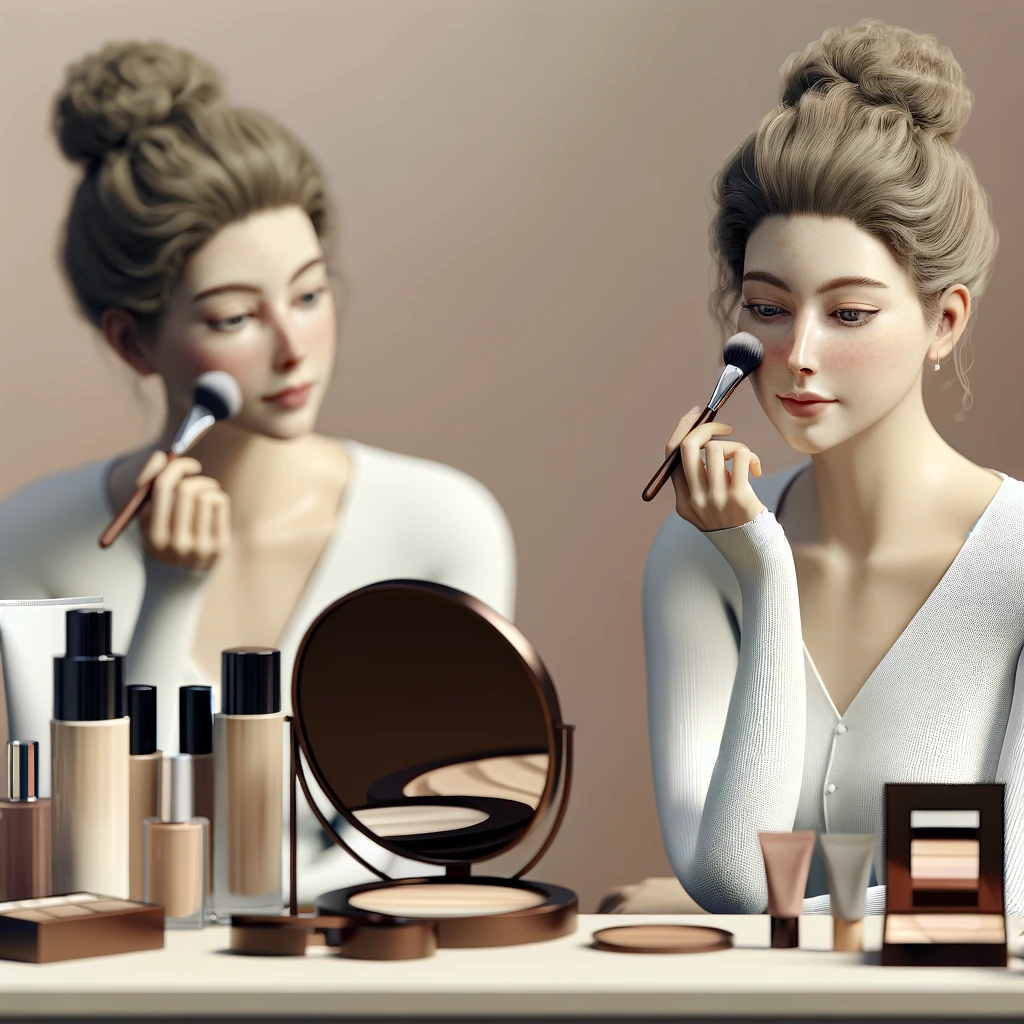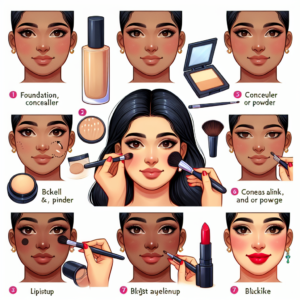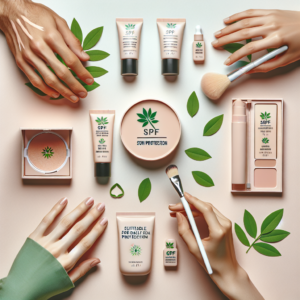
Key Takeaways
- Vegan makeup is often suitable for sensitive skin as it avoids common animal-derived irritants.
- Natural SPF in makeup provides protection against the sun while being gentle on sensitive skin.
- Look for natural oils, butters, and minerals as key ingredients in hypoallergenic makeup for their soothing properties.
- Antioxidants in makeup can help protect sensitive skin from environmental stressors.
- Always read labels carefully to ensure the product is truly hypoallergenic and suitable for your skin type.
| Category | Details |
|---|---|
| Key Benefits of Vegan Makeup for Sensitive Skin | – Suitable for sensitive skin, avoiding animal-derived irritants – Natural SPF protection against sun, gentle on skin |
| Top Ingredients in Hypoallergenic Makeup | Natural Oils and Butters: Shea Butter, Jojoba Oil, Argan Oil, Coconut Oil Minerals: Mica, Zinc Oxide, Titanium Dioxide Antioxidants: Green Tea Extract, Vitamin C, Vitamin E |
| How to Identify Truly Hypoallergenic Products | – Look for short ingredient lists with recognizable items – Be wary of long, unpronounceable chemical names – Check for certifications like Vegan Society or Leaping Bunny – Terms like ‘non-comedogenic’, ‘fragrance-free’, and ‘for sensitive skin’ can be indicators |
| Ingredients to Avoid | – Parabens – Phthalates – Synthetic fragrances – Formaldehyde and formaldehyde-releasing preservatives |
| Application Techniques for Sensitive Skin | – Start with gentle cleansing and moisturizing – Use soft-bristled brushes, sponges, or beauty blenders – Clean tools regularly – Apply makeup lightly; less is often more |
| Recommended Products | For Dry Sensitive Skin: XYZ Hydrating BB Cream For Oily Sensitive Skin: ABC Mineral Powder For Combination Sensitive Skin: DEF Tinted Gel Moisturizer |
| FAQs | – Vegan makeup can provide sufficient SPF protection – Perform a patch test by applying a small amount on a discreet skin area and wait 24-48 hours – Vegan hypoallergenic makeup typically lasts 6 months to 2 years – Expanded range of shades in hypoallergenic makeup for all skin tones – Mixing different vegan makeup brands is generally safe |
Discover the Soothing Power of Vegan SPF Hypoallergenic Makeup
For those of us with sensitive skin, finding makeup that doesn’t cause irritation can be a challenge. But here’s some good news: vegan hypoallergenic makeup can be a game-changer. Not only is it kinder to animals, but it’s also formulated without many of the ingredients that typically trigger skin reactions. And when it comes with built-in SPF, it’s like hitting the jackpot for skin protection and care.
What Makes Vegan Makeup a Sensitive Skin Savior?
Vegan makeup means that no animal-derived ingredients are used, which is a big plus for sensitive skin. Traditional makeup can contain lanolin, beeswax, or carmine – all of which can cause reactions in some people. Vegan products tend to focus on plant-based ingredients that are less likely to irritate. And because vegan makeup is often made with a more natural approach, you’re also avoiding synthetic fragrances and dyes, which are common culprits in skin sensitivities.
Natural SPF: Your Invisible Shield Against the Sun
When it comes to protecting sensitive skin, SPF is non-negotiable. Sun damage can lead to irritation and exacerbate existing skin issues. Vegan makeup that includes natural SPF not only shields you from harmful UV rays but does so without the harsh chemicals found in conventional sunscreens. Ingredients like zinc oxide and titanium dioxide provide physical barriers against the sun, which are less likely to cause skin reactions compared to chemical sunscreens.
Top Ingredients to Look for in Hypoallergenic Makeup
Let’s dive into the ingredients that can make hypoallergenic makeup a soothing sanctuary for your skin. Knowing what to look for is half the battle when you’re navigating the makeup aisle.
Natural Oils and Butters
Natural oils and butters are your friends when it comes to moisturizing and soothing sensitive skin. They provide essential fatty acids and vitamins that nourish the skin, and they’re gentle enough for most sensitive skin types. Here’s a quick list of some skin-loving oils and butters:
- Shea Butter: A rich source of vitamins A and E, known for its moisturizing properties.
- Jojoba Oil: Its structure closely resembles the skin’s natural sebum, making it an excellent hydrator.
- Argan Oil: Packed with antioxidants and vitamin E, it’s great for both moisturizing and anti-aging.
- Coconut Oil: Though it can be comedogenic for some, it’s an excellent moisturizer for many with dry, sensitive skin.
Minerals: The Gentle Alternative
Mineral makeup is often a safe bet for sensitive skin. It uses ingredients like mica, zinc oxide, and titanium dioxide, which are less likely to cause reactions. These minerals provide a natural, luminous finish and can offer sun protection. Additionally, they don’t clog pores, making them ideal for those prone to acne or rosacea.
Antioxidants: Nature’s Own Skin Protectors
Antioxidants are a sensitive skin’s knight in shining armor. They protect against environmental damage and can help calm inflammation. Look for makeup with green tea extract, vitamin C, or vitamin E, all of which have antioxidant properties and can support skin health while you wear your makeup.
How to Identify Truly Hypoallergenic Products
Now, let’s clear up some confusion. ‘Hypoallergenic’ is a term that’s not regulated, which means any brand can claim it without proof. So, it’s up to you to be a detective.
Understanding Labels and Certifications
Here’s the scoop: certifications from organizations like the Vegan Society or Leaping Bunny mean that a product is vegan and cruelty-free, but not necessarily hypoallergenic. To check for hypoallergenic properties, you’ll need to look at the ingredient list. If you see long, unpronounceable chemical names, be wary. Instead, look for short ingredient lists with recognizable items.
Remember, even natural ingredients can cause reactions for some people. So, if you’re trying a new product, always do a patch test first by applying a small amount to your inner arm or behind your ear to see if there’s a reaction.
Besides that, keep an eye out for terms like ‘non-comedogenic’ (won’t clog pores), ‘fragrance-free’ (no synthetic scents), and ‘for sensitive skin’ (formulated to be gentle). These aren’t foolproof, but they’re a good start.
Most importantly, trust your skin. If a product labeled ‘hypoallergenic’ still causes a reaction, it’s not for you. Your skin’s response is the ultimate test.
The Sneaky Allergens: What to Avoid in Makeup
Even the most innocent-looking products can harbor allergens that might wreak havoc on sensitive skin. It’s essential to avoid certain ingredients that are notorious for causing reactions. Stay clear of:
- Parabens: Often used as preservatives, these can irritate the skin.
- Phthalates: Found in products to increase flexibility, these chemicals can be harsh on sensitive skin.
- Synthetic fragrances: These can contain hundreds of chemicals, many of which can cause allergic reactions.
- Formaldehyde and formaldehyde-releasing preservatives: Known irritants that can trigger allergic reactions.
By being vigilant about these ingredients, you’ll stand a much better chance of keeping your sensitive skin calm and clear. For more information, explore our guide on vegan makeup for sensitive skin with SPF.

Application Techniques for Sensitive Skin
How you apply makeup can be just as important as the makeup itself, especially for sensitive skin. The key is to be gentle to avoid any unnecessary irritation.
Prep Your Canvas: Skincare Before Makeup
Before you even think about makeup, make sure your skin is well-prepared. Start with a gentle cleanser that doesn’t strip your skin of its natural oils. Follow up with a soothing moisturizer, and give it time to absorb before you apply makeup. This will help create a smooth, hydrated base for your makeup to glide on to.
Gentle Does It: Best Practices for Applying Makeup
When applying makeup, use a light hand. Here are a few tips:
- Use brushes with soft bristles to avoid scratching or irritating the skin.
- Opt for sponges or beauty blenders for foundation application, as they can be less abrasive than brushes.
- Always clean your tools regularly to prevent the buildup of bacteria that could lead to irritation.
Remember, less is often more with sensitive skin. Don’t over-apply, and choose products that have multiple uses to reduce the number of different substances on your skin.
Expert Picks: Recommended Products for Every Sensitive Skin Type
Now, let’s talk products. Everyone’s skin is unique, so what works for one person may not work for another. However, there are some standout products that tend to be well-tolerated by sensitive skin types.
For Dry Sensitive Skin
For those with dry and sensitive skin, hydration is key. Look for products that have a creamy texture and contain hydrating ingredients like hyaluronic acid or glycerin. A good example is a BB cream that offers both moisture and coverage, without the heaviness of traditional foundations.
For example, the XYZ Hydrating BB Cream is packed with nourishing ingredients and has a gentle SPF 15, making it a great choice for dry, sensitive skin. It’s free from common irritants and provides a dewy, natural finish.
For Oily Sensitive Skin
Oily sensitive skin can be a bit trickier, as you want products that control shine without causing dryness or irritation. Mineral powders are often a good choice, as they absorb excess oil and are less likely to clog pores.
Take the ABC Mineral Powder, for instance. It’s talc-free, uses natural minerals to absorb oil, and is designed specifically for sensitive skin. Plus, it offers a light SPF protection as an added bonus.
For Combination and Other Sensitive Skin Types
If you have combination skin or another type that doesn’t fit neatly into the dry or oily categories, you’ll want versatile products that balance your skin. Tinted moisturizers with a gel-like consistency can provide hydration without adding too much oil.
The DEF Tinted Gel Moisturizer is a favorite for many with combination sensitive skin. It hydrates where needed while providing a matte finish in oilier zones. And it’s made with soothing ingredients like aloe vera and chamomile.
FAQs
Can vegan makeup provide enough SPF protection?
Yes, many vegan makeup products offer SPF protection using natural mineral ingredients like zinc oxide or titanium dioxide. These ingredients provide a physical barrier to protect the skin from UV rays. Just be sure to check the SPF rating on the product to ensure it meets your sun protection needs.
How do I perform a patch test for hypoallergenic makeup?
To perform a patch test, apply a small amount of the product to a discreet area of skin, such as behind the ear or on the inner forearm. Wait for at least 24 hours to see if there is any redness, swelling, itching, or other signs of irritation. If you experience any of these reactions, it’s best to avoid using the product on your face.
What is the shelf life of vegan hypoallergenic makeup?
The shelf life of vegan hypoallergenic makeup can vary depending on the product and its ingredients. Generally, these products have a shelf life similar to non-vegan makeup, ranging from 6 months to 2 years. Always check the expiration date and be aware of any changes in color, smell, or texture that could indicate the product is no longer good to use.
Are there color options in hypoallergenic makeup suitable for all skin tones?
While the range of shades in hypoallergenic makeup has historically been limited, many brands are now expanding their color options to cater to all skin tones. It’s worth exploring different brands to find the perfect match for your complexion.
Can I mix different vegan makeup brands or will it increase the risk of skin irritation?
It’s generally safe to mix different vegan makeup brands, but if you have very sensitive skin, it’s wise to introduce new products one at a time. This way, if you do have a reaction, it’s easier to identify the culprit. And always patch test new products before applying them to your face.
Understanding what’s in your makeup and how it affects your skin is crucial, especially when you’re dealing with sensitivities. That’s why turning to vegan hypoallergenic makeup with SPF is more than just a trend—it’s a thoughtful approach to beauty that respects both your skin and the environment.
With the right knowledge and products, you can enhance your natural beauty without compromising your skin’s health. Embrace the power of nature with vegan hypoallergenic makeup and enjoy a radiant, protected complexion every day.
Can vegan makeup provide enough SPF protection?
Yes, vegan makeup can provide sufficient SPF protection, especially when it contains natural mineral ingredients like zinc oxide and titanium dioxide. These create a physical barrier on the skin’s surface, reflecting UV rays away. While chemical sunscreens absorb and convert UV rays, these mineral-based alternatives are less likely to cause irritation, making them ideal for sensitive skin. Just make sure to choose a product with an appropriate SPF level for your needs and reapply as necessary throughout the day.
How do I perform a patch test for hypoallergenic makeup?
To ensure a product won’t irritate your skin, always do a patch test. Apply a small amount to a discreet area, like behind your ear or on the inner forearm, and wait 24 to 48 hours. If there’s no reaction, you’re likely good to go. If there is a reaction, however, it’s best to steer clear of that product. This simple test can save you from discomfort and skin setbacks.
- Choose a small, inconspicuous area of skin for the test.
- Apply a small amount of the product and wait for 24 to 48 hours.
- Look for any signs of irritation, redness, or swelling.
- If your skin reacts, avoid using the product.
It’s a straightforward process that can prevent a lot of potential skin trouble.
What is the shelf life of vegan hypoallergenic makeup?
Just like conventional makeup, vegan hypoallergenic makeup has a finite shelf life. Typically, you can expect products to last anywhere from 6 months to a couple of years. Always check the packaging for an expiration date and pay attention to any changes in texture, scent, or color that might indicate it’s time to toss it out. Keeping your makeup fresh isn’t just about performance—it’s also about keeping your skin safe.
Are there color options in hypoallergenic makeup suitable for all skin tones?
Thankfully, the range of shades in hypoallergenic makeup has expanded significantly. Brands are recognizing the importance of inclusivity and are creating formulations that cater to a diverse array of skin tones. It may take a bit of research, but you’re likely to find a match for your unique complexion within the growing selection of hypoallergenic products.
For instance, the Inclusive Beauty line by True Colors offers a wide range of shades in their hypoallergenic foundation, ensuring that everyone can find their perfect match without fear of irritation.
Finding the right shade is no longer as challenging as it once was, and that’s a win for beauty lovers with sensitive skin.
Can I mix different vegan makeup brands or will it increase the risk of skin irritation?
Mixing different vegan makeup brands is generally safe, but if your skin is particularly sensitive, it’s wise to be cautious. Introduce new products gradually, so if your skin reacts, you’ll know which product is responsible. And always remember to perform a patch test before using a new product on your face to minimize the risk of a reaction.
By following these guidelines, you can enjoy a variety of vegan makeup options without compromising your skin’s comfort and health.




